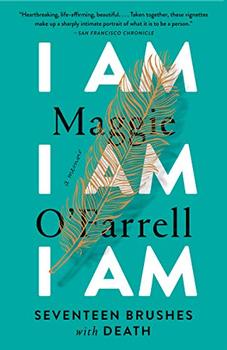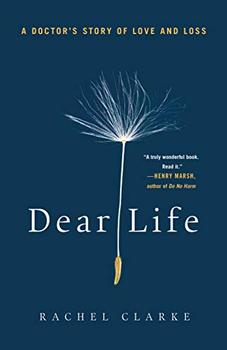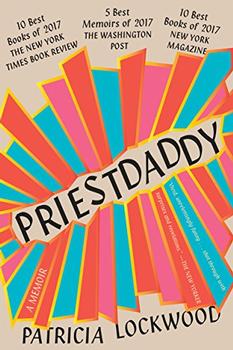Summary | Excerpt | Reading Guide | Reviews | Beyond the book | Read-Alikes | Genres & Themes | Author Bio

Seventeen Brushes with Death
by Maggie O'FarrellIn I Am I Am I Am: Seventeen Brushes with Death, acclaimed novelist Maggie O'Farrell, speaks to the beauty and importance of life, even at its most ordinary, by closely examining seventeen of her own personal experiences. It is an unusual format for a memoir, but one that works well.
The seventeen chapters are each named after a part of the body and the year in which O'Farrell experienced a particular near brush with death (See Beyond the Book). The memoir opens with "Neck (1990)," a chilling narrative of eighteen-year old O'Farrell confronted by a strange and threatening man while walking alone on a remote hillside. "I still," she writes, "cannot bear anyone to touch my neck." But in another chapter, this one titled "Neck (2002)," she has to deal with just that, when robbed in Chile by a man who held a machete to her throat.
Not all these accounts are rooted in attacks or assaults, however: far from it. In "Whole Body (1993)," O'Farrell describes a near plane crash as she travelled alone to Hong Kong. In "Lungs (1988)," "Lungs (2000)," and again in "Lungs (2010)," she gets into trouble in water, to some degree due to her own rashness. There are also medical dramas from her childhood and her experiences with birth, miscarriages and parenting that provide some of the most moving and memorable sections of this impressive work.
The stories in I Am I Am I Am are not arranged chronologically. Instead O'Farrell criss-crosses the years and decades of her life, challenging the reader to piece together her biography, almost like a jigsaw puzzle. The reader wonders, for example, if the male friend who gives O'Farrell a compass as she sets off to Hong Kong is the same man that she writes to from China. Is he the same person later referenced as Will? Does Will, in turn, become O'Farrell's husband and the father of her children? But this is not a biography in the traditional sense and these questions remain unanswered.
Notwithstanding this playful and unusual arrangement, there is still a strong sense of progression though the book, which culminates in two highly striking stories: one about O'Farrell as an eight-year old child and the other about her eight-year old daughter.
O'Farrell's starting point in I Am I Am I Am may be death, but her subject is life and living. This is a book full of original descriptions of familiar experiences, for example, "the sucking draw of the blood test, the cochineal shock of what appeared in the syringe." There are also instances of wry humor, for example, the boyfriend who cheats on her claiming he did it "for us." Even in the most desperate times, when as an eight year-old in hospital O'Farrell realizes that the hospital staff think she will die, she is a witty observer listing the "clues" she uses to make this conclusion, and particularly all the great presents she receives.
O'Farrell plays with points of view, moving to the second person "you" to describe herself in moments of great stress, and the third person to create distance from events from her past, notably of her twenty-year old self, vastly different from her now as a mother in her forties. And throughout, she is insightful, reflecting on the universality of her experience. Her stories are her own but they are recognizable – narratives of near accidents, dangerous encounters and medical crises most of us have some knowledge of. "If you are aware of these moments," she writes, "they will alter you. You can try to forget them, to turn away from them, to shrug them off, but they will have infiltrated you, whether you like it or not." Readers may find their own memories stirred by reading O'Farrell's memoir – something else to savor along with the sage words from a writer at the peak of her powers.
![]() This review was originally published in The BookBrowse Review in April 2018, and has been updated for the
April 2019 edition.
Click here to go to this issue.
This review was originally published in The BookBrowse Review in April 2018, and has been updated for the
April 2019 edition.
Click here to go to this issue.

If you liked I Am, I Am, I Am, try these:

by Rachel Clarke
Published 2020
In Dear Life, palliative care specialist Dr. Rachel Clarke recounts her professional and personal journey to understand not the end of life, but life at its end.

by Patricia Lockwood
Published 2018
From Patricia Lockwood - a writer acclaimed for her wildly original voice - a vivid, heartbreakingly funny memoir about having a married Catholic priest for a father.
Some books are to be tasted, others to be swallowed, and some to be chewed on and digested.
Click Here to find out who said this, as well as discovering other famous literary quotes!
Your guide toexceptional books
BookBrowse seeks out and recommends the best in contemporary fiction and nonfiction—books that not only engage and entertain but also deepen our understanding of ourselves and the world around us.